Are Mushrooms Good for You? 7 Health Benefits You Must Know
Mushrooms come in many shapes and sizes and are a popular ingredient in many dishes. They can be a delicious topping on your favorite pizza or even a staple ingredient in a vegetarian or vegan diet. But are mushrooms good for you? Absolutely! Their many health benefits make them the perfect choice for those trying to eat healthier.
There are precautions, of course, and they can cause allergies. But most people will benefit from eating mushrooms. Plus, there are so many types and ways to cook them; even the most picky eaters will find some they like.
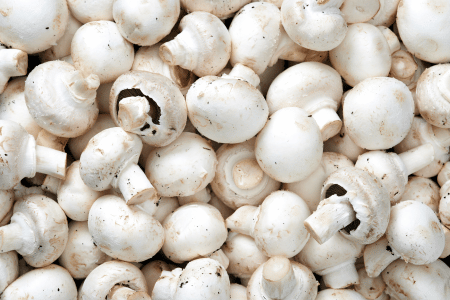
Types of mushrooms
There are thousands of mushrooms around the globe. So many, in fact, that scientists don’t know the exact number.
Most people are aware there are edible and poisonous ones, respectively. But from there, the other types all start to blur. Of the thousands of known species, only about two dozen can be used as food. The others—some will be hallucinogenic, and others can kill you.
You’ll feel the symptoms of mushroom poisoning within a few hours of eating them. They include:
- Difficulty breathing and swallowing
- Confusion
- Diarrhea
- Excessive saliva
- Dilated pupils
- Nausea
- Vomiting
- Excessive sweating
Don't rush to taste them if you’re out in nature and want to try picking mushrooms. It’s better to ask an expert to avoid poisoning yourself.
The ones you’ll find most often in the US include:
- Shiitake. Popular in Asian cuisine but also in stir-fries and soups, they’re known for their creamy texture.
- Portobello. These are the most used as meat replacements in vegan and vegetarian foods. They have a dense, firm texture and are very versatile, so you can use them in almost any dish you want.
- Champignon (also known as button mushrooms). The smaller brothers of the portobello mushrooms, champignon, are the ones you’ll most commonly find in supermarkets and can be used in most dishes.
- Porcini. If you’re into gourmet foods, porcini mushrooms are the way to go. You can use them in risotto, pasta dishes, and even soups. They have a distinct, robust, earthy flavor.
- Oyster. These mushrooms resemble oysters, hence the name. Like porcini and champignon, they’re extremely versatile, so you can use them in many recipes.
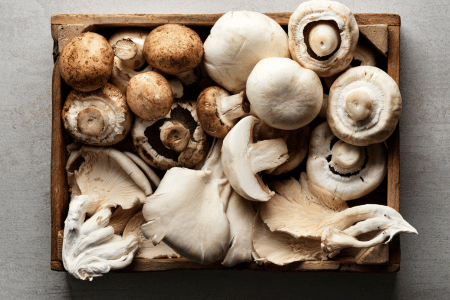
What’s in mushrooms?
Mushrooms are healthy and nutritious, a real superfood. But what exactly is in one? What is their nutritional profile? The exact composition varies slightly depending on the type you’re eating. But most will contain around 15 calories per cup, along with 2 grams of protein, 2 grams of carbs, and 0.2 fats. In terms of nutrients, they’re great sources of:
- Selenium
- Vitamin B6
- Potassium
- Zinc
- Copper
- Magnesium
- Niacin
- Vitamin D
- Riboflavin
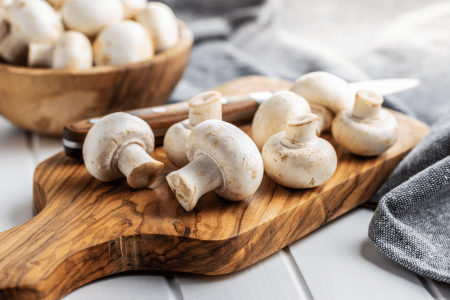
7 health benefits of mushrooms
Mushrooms are full of nutrients, they’re high in protein, and they may even help with various health conditions. Here are some of their best-known benefits.
1. May boost the immune system
Mushrooms are high in antioxidants, which help reduce chronic inflammation and boost your immune system. They’re also high in selenium, vitamin B6, and vitamin D, three essential components of strong immunity.
2. May reduce cancer risk
Because of their content of antioxidants and their capacity to reduce inflammation, mushrooms may help reduce cancer risk.
A systematic review of 17 studies between 1966 and 2020 showed that eating only 18 grams of mushrooms per day may reduce your cancer risk by up to 45%. One reason may be the high content of ergothioneine, an amino acid that slows down cellular damage.
3. Lower cholesterol levels
Research shows some varieties, like shiitake mushrooms, may prevent dyslipidemia, thus promoting lower cholesterol levels. This is especially true for those who replace meat with mushrooms, at least for some of their meals, but others can benefit too.
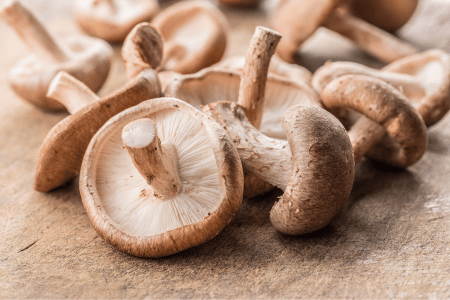
4. Can help with weight loss
Whenever you think of foods and diets, weight loss inevitably comes to mind. And mushrooms can be very helpful in that department. A study conducted in 2018 looked at the effects of edible and medicinal mushrooms on weight loss and saw encouraging results. People who substituted only 20% of their meat consumption with mushrooms lost more weight.
Keep in mind that a mushroom-rich diet can only go so far. Most studies on the topic showed encouraging results. But the best ones were seen in those who combined their diet with exercise and a healthy lifestyle.
5. May help lower blood pressure
Potassium is an essential mineral for normal blood pressure levels. Sadly, most people in the US don’t get enough of it in their diets. You can find potassium in bananas but also in mushrooms. Adding just a few servings of mushrooms to your diet each week may help you lower blood pressure levels.
Plus, research shows the taste of mushrooms can lower your need for salt. Excessive consumption of salt is a known factor in high blood pressure. Luckily, you don’t have to give up the flavors you love if you use mushrooms. A 2014 study showed that replacing half the meat in a ground beef recipe with mushrooms reduced the salt intake by 25% while keeping the same taste.
6. They can protect brain health
Cognitive decline is a natural part of aging. But that doesn’t mean there’s nothing you can do to protect your brain. A study published in 2019 looked at people aged 60 or older and discovered that those who ate 2 cups of mushrooms per week had a lower risk of mild cognitive impairment.
But the good news doesn’t stop there. Another study showed mushrooms may help lower the risk of diseases such as Alzheimer’s and Parkinson’s. This is only one study, and research in the area is still ongoing, but the results we have so far are promising.
7. Can improve gut health
They often say that health starts in the gut. Low immunity, inflammation, and other conditions often start with poor gut health. Luckily, mushrooms can help balance your gut microbiome by encouraging the growth of good bacteria.
You’ll still need to pay attention to the rest of your diet. Eating mushrooms won’t be very useful if your diet is filled with processed and fast food. But they are a step in the right direction, and along with a healthy diet, they can boost your gut health.
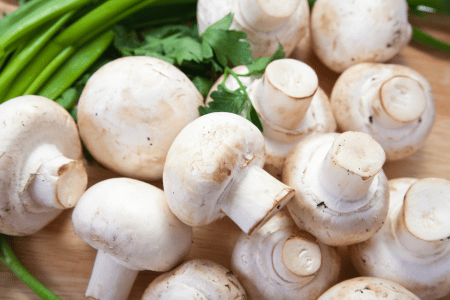
Do mushrooms have side effects?
Speaking strictly about edible mushrooms, they have very few side effects. The most considerable risk is that of an allergic reaction. While rare, mushroom allergies exist. Reactions vary from hives and itchy skin to more serious ones, like breathing difficulties and anaphylaxis.
Some people may also experience digestive discomfort like bloating, gas, or an upset stomach.
Finally, mushrooms may sometimes interact with certain drugs. They can interfere with their metabolism or reduce their effectiveness. When in doubt, ask your healthcare provider about what foods the drugs you take interact with.
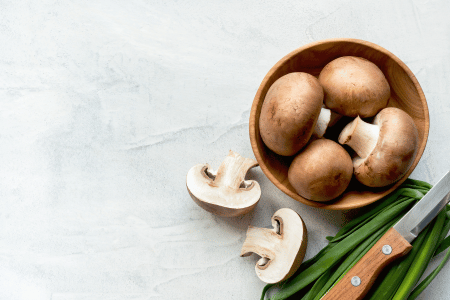
The bottom line—are mushrooms good for you?
Mushrooms have a lot of health benefits. They can boost the immune system, reduce cancer risk, help you lose weight, and even protect your brain health.
They come in many shapes and varieties. Some have a stronger taste, and others are more mild. You can use them in many recipes, and they can be a great meat-replacement option in vegan and vegetarian diets.
How do you like to eat mushrooms? Did you know they have all these benefits? Join us on Facebook and share your thoughts.
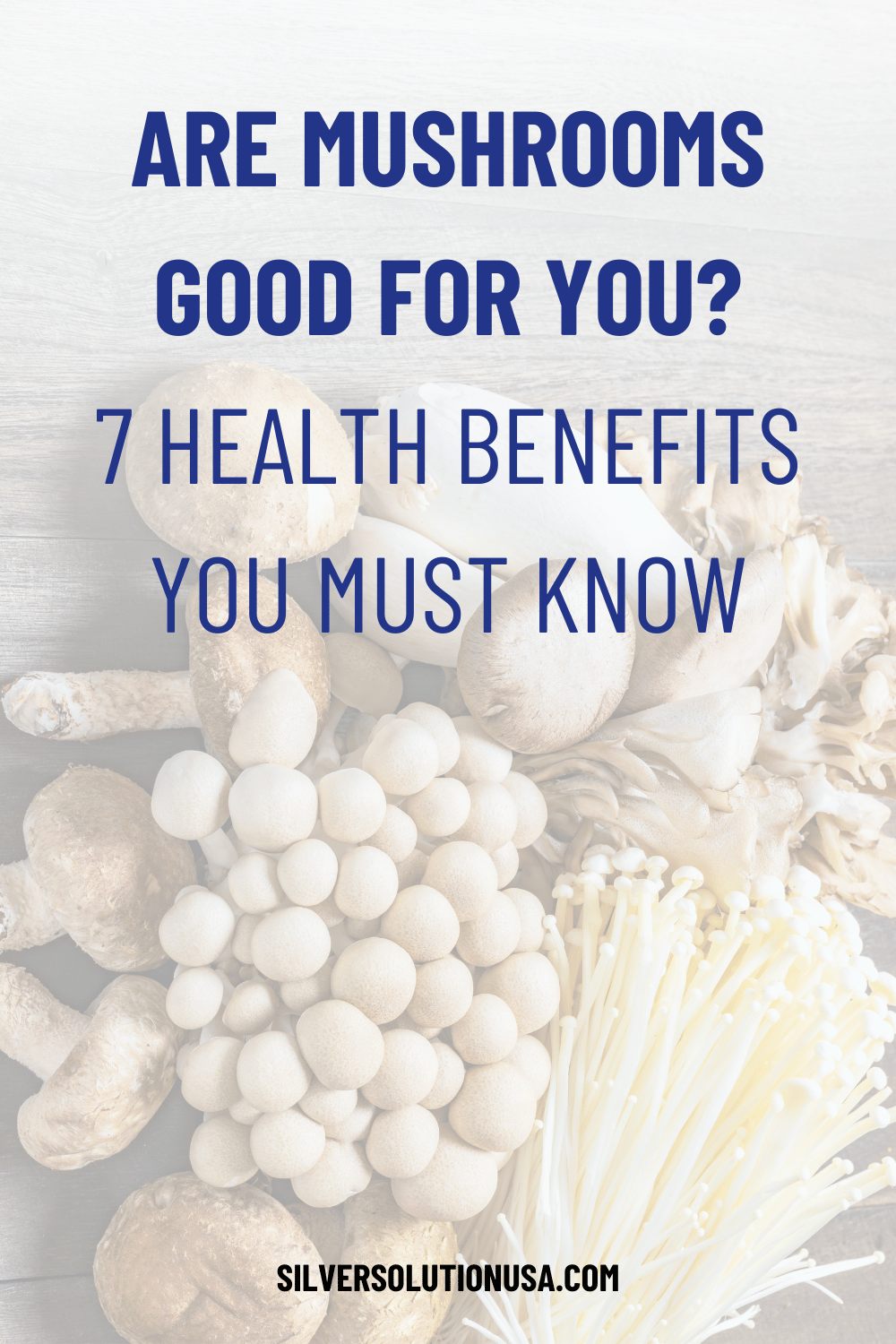
Health/Medical Disclaimer
This blog post does not provide health or medical advice. This blog post is for informational and educational purposes only and is not a substitute for professional health or medical advice. Before taking any actions based upon such information, we encourage you to consult with the appropriate medical and healthcare professionals. We do not provide any kind of health or medical advice. The use or reliance of any information contained on this blog is solely at your own risk.
Sources
https://academic.oup.com/advances/article/12/5/1691/6174025
https://pubmed.ncbi.nlm.nih.gov/34375514/
https://www.ncbi.nlm.nih.gov/pmc/articles/PMC6278646/
https://pubmed.ncbi.nlm.nih.gov/25124478/
https://content.iospress.com/articles/journal-of-alzheimers-disease/jad180959
https://onlinelibrary.wiley.com/doi/10.1002/mnfr.202100606
Recent Posts
-
Are sunscreen ingredients harmful?
Sunny days can bring a lot of fun. Going out for a swim, spending time in nature, or relaxing on the …18th Mar 2024 -
The Veggie Debate: Does Cooking Vegetables Destroy Nutrients and the Best Ways to Cook Them
Vegetables are one of the healthiest foods you can choose. Some people downright hate them, while so …4th Mar 2024 -
Best Foods for COVID Recovery and Prevention
A few years ago, a new virus took the world by surprise. COVID-19 may look like the flu on the surfa …19th Feb 2024




